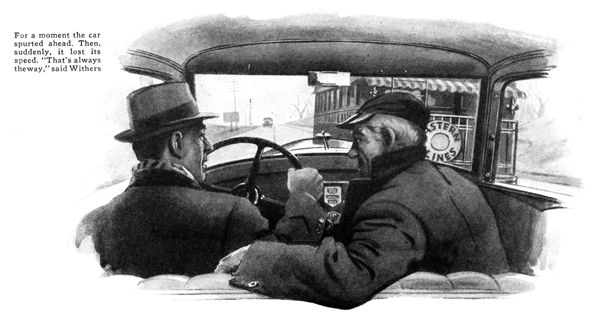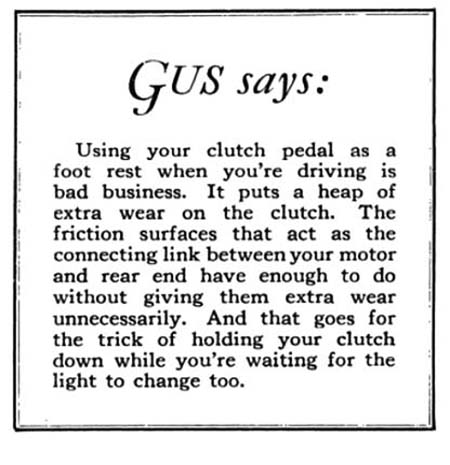March 1935
WHEN YOUR MOTOR MISSES
by Martin Bunn

With a clear road ahead, Cy Withers nosed his car out from behind a large bus and stepped on the gas. For a moment, the car spurted ahead. Then, suddenly, as if bucking a strong wind, it hesitated and lost speed. Withers turned to Gus Wilson, who was riding beside him.
"Now, do you see what I mean?" he grumbled. "That's always the way. At low speeds, she's swell, but as soon as I step on it to pass something, she dies on her feet."
Gus rubbed the stubble on his chin thoughtfully. "Let's try it again," he suggested. "Only don't step on it so hard, and when she begins to lose speed, let up on the accelerator for a second or so."
Withers nosed out of line for another try. This time, by feeding the gas in spurts, he did manage to pass the bus, but only after a tight squeeze with a loaded truck going in the opposite direction.
"Phew!" exclaimed Gus, nervously. "A little better, but none too good at that. Suppose you pull over to the side of the road, and we'll take a look under the hood."
"Could the spark plugs have anything to do with it?" Withers put in a few minutes later, as Gus ran his skilled fingers over the various rods and pipes that sprouted from the carburetor.
"They could, but I've got a hunch it's something else this time. There's a heap of things besides spark plugs that can make a motor miss." Working as he talked, the veteran mechanic went over the motor from stem to stern. Everything from the distributor to the vacuum tank came in for its share of attention.
"New heater?" he asked suddenly, putting two hose connections that led through the cowl wall.
Withers nodded. "Put it in myself about three months ago," he declared proudly.
"Well, you made a fine job of the heater, but you certainly messed up the vacuum tank."
"Messed up the vacuum tank?" Withers echoed, peering over Gus's broad shoulders. "I never even touched it."
"Maybe not," Gus replied, "But you sure put a swell kink in this pipe that runs from your intake manifold to the top of the vacuum tank. Got a roll of tire tape in your tool kit?"
After several minutes of rummaging, Withers emerged holding a small black roll. Gus stripped off several feet and proceeded to wrap it around the sharp bend in the small pipe. "There," he grunted, pressing the end of the tape in place. "Now suppose we try her again and see what happens."
Much to Withers' surprise, the car seemed peppier as it gained speed. At forty miles an hour, the motor still ran smoothly, and as the speedometer climbed to forty-five and then on to fifty, a broad satisfied grin beamed across Gus Wilson's face.
"Well, that sure turned the trick," agreed Withers as the two men started the trip back to the Model Garage. "But I still don't see why bandaging that pipe made so much difference."
"Ever try to suck water through a leaky straw?" asked Gus. "That's what your motor was trying to do, only the leaky straw was the manifold suction pipe that puts the vacuum in your vacuum tank, and the water was gasoline. When you tried to make room for those heater connections, you must have bent the suction pipe and cracked it. Naturally, air leaked in, spoiled the suction, and cut down the vacuum in the vacuum tank.
"At low speed the leak didn't make much difference. The intake manifold developed plenty of suction, and the motor didn't need much gas. At high speed, though, it was different. Your motor needed plenty of gas, the manifold suction was less, and the leak cut down the suction just enough so that the supply of gas in the vacuum tank couldn't keep up with the demand."
By this time, the car had reached the Model Garage, and Gus directed Withers into the repair shop.
"You know," Gus mused, as he started to work putting in a new length of pipe. "It's a funny thing about this garage business. Jobs seem to run in bunches. This is the third gas-feed job I've had this week, and the second one that's had something to do with the vacuum tank.
"Monday morning, a fellow came in here all in a huff. Seems he'd been having trouble with his vacuum tank. Around the city, it was fine, but as soon as he tried a trip it ran dry.
"The first time it happened, he thought he'd got some dirty gasoline, so he had the gas line cleaned, threw out three quarters of a tank of gas, and filled up with fresh. It looked like he had it licked until the morning he came in here at the end of his neighbor's row rope. He was fit to be tied and blamed the gasoline again, but the joke was on him."
"What was the matter? Empty gas tank?"
"Worse than that," Gus chuckled. "About two weeks ago, he lost his gas-tank cap, as he went to an auto-supply store and bought a fancy, nicked-plated affair.
He didn't know there were two kinds and bought one without a vent hole in it. Having a vacuum-tank car, he should have got one with a vent hole. Naturally, the vacuum tank couldn't suck against the vacuum formed in the gas tank so it ran dry. In the city, where he made short runs, the car generally was idle long enough between times for air to leak in around the threads and equalize things, but on long trips, it was just too bad."
"What was the second job?" asked Withers.
"That was a funny one, too. One of our best customers took a long trip about a week ago. Everything went fine until his feed line started to act up. Every hundred miles or so, it would get clogged, and he'd have to stop and have it blown out. Dirt was getting into the gas tank in some way, but none of the garages along the road could locate it.
"When he got home on Tuesday, he came in here. I had a hunch, and took the tank off the chassis. As I was lifting it up on the bench I heard a peculiar rattle, so I started fishing around inside the tank with a couple of long wires. It wasn't long before I pulled out three feet of rubber tubing."
"Rubber tubing?"
"Sure. He probably had his car parked some place and a gasoline thief tried to siphon off the gas. Something scared him, and instead of pulling the tube out, he dropped it. After that, it was just a question of time until the gasoline started to attack the rubber and break it up into small pieces."
"Are gas troubles the only things that can make a car sputter and miss?" asked Withers.
"Not by a long shot. All sorts of things can happen to make a motor miss, but you generally can trace them by noticing when it misses the most.
"If it misses at high speed, but runs pretty smoothly at low speed, it's likely to mean that the breaker points are set too close, that the spark-plug points are too close together, that the high-speed mixture in the carburetor is wrong, or that the valve springs are weak.
"Lots of cars miss at low speed, but run fine at high speed," added Gus. "In that case, the spark plug points may be too far apart, the breaker points may be too widely spaced, the choke may be stuck, the manifold may leak, or the valves may be worn."
"But what makes a car miss at all speeds?" asked Withers.
"A whole mess of things can cause that. Poorly adjusted valves, stuck valves, dirt in the carburetor, a plugged fuel line, leaks in the ignition wiring, bum spark plugs, a cracked distributor head or rotor, or a poor carburetor mixture."
Just then, Joe Clark, Gus's partner poked his head through the door. "Ned Hoffman just drove in, Gus," he called. "Wants you to take a look at his engine. Got a bad sputter, and thinks maybe one of the spark plugs is fouled."
"What did I tell you?" grinned Gus. "Number four and it's only Wednesday. This seems to be the week when the Model Garage is the port of missing motors."
END
L. Osbone 2019
